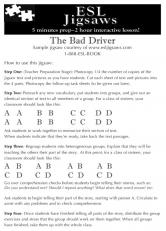ESL Jigsaws
5 Minutes Prep - 2 Hour Interactive Lesson!
Viewing entries tagged with 'worksheet'
International Women's Day for Low Beginners
Many countries celebrate International Women’s Day on March 8th. In some countries, it is the equivalent of Mother’s Day or Valentine’s Day.
Soft Skills: Small Talk About the Weather
Over the years I've had numerous students say they've been turned down after job interviews because they lacked local experience. If having worked locally were a prerequisite for the job, would their resumés not have precluded them from even getting the interview? More likely the experience referred to is related not to quantifiable hard skills but rather to more intangible soft skills that enable a person to "fit in", such as knowledge of local language and the ability to engage in small talk.
Christmas Reading for Low Beginners
The Christmas story below is geared for literacy and low beginner ELL students. It is adapted from Callan’s Canadian Holidays for Low Beginner ESL, but is suitable for use in America as well. Further low beginner exercises on Christmas, with pictures, are found in that book. An audio CD and cloze exercise are also available. (For free material for mid-beginner or intermediate level, check out my blog post on Christmas from last year, here. Or why not try a jigsaw lesson for Christmas? Check out Callan's Holiday Jigsaws.)
Telephone Voice Mail Messages
Many new immigrants answer the phone in their own language. A Korean immigrant might answer, "Yabusayo?" A Chinese immigrant might answer, "Wei?" Often their thinking is that most people who call them speak their language anyway and those who don't will understand that they are simply answering in their own language.
Coins and Bills for Low Beginners
As tax season approaches, we often teach a unit on money. With low beginners, I structure my unit around learning numbers, counting, asking and saying prices, the names of bills and coins, and finally the task of asking for change. I've put together some exercises for Canadian and American teachers on asking for change.
Collective Nouns for Animals for Intermediate Level
I've taken a moment to make a test of English for you, the ESL or EFL teacher, for fun! Let's see how well you do! Simply choose the correct collective noun.
Cultural Differences in Gift Giving
One of the most important things we can do as ESL teachers is to help our students crack the cultural code. Gift giving has a lot of unspoken rules which may seem inscrutable to newcomers. Unconvinced? See if you were aware of these cultural attitudes to gift giving in other cultures:
Teaching Food at Higher Levels
If you're like me, you like to teach your food unit during the summer when the grocery stores are full of fresh produce and farmers' markets are in full swing.
Garage Sales & Thrift Stores
It's summer and I'm back on the topic of second hand shopping. If you are teaching English to new immigrants, they may see something as they walk around their neighbourhoods at this time of year that they don't have in their home countries: garage sales. Likewise, they will likely come across thrift stores or flea markets in their neighbourhoods.
Writing About Household Repairs
I'm a big fan of using picture dictionaries to teach ESL, particularly to beginner and intermediate levels. Oxford Picture Dictionary, Heinle, Word By Word, I use them all. While they are all excellent and worth purchasing, my favourite is the Oxford Picture Dictionary because the pictures are so clear and pleasing. They also have different levels.


